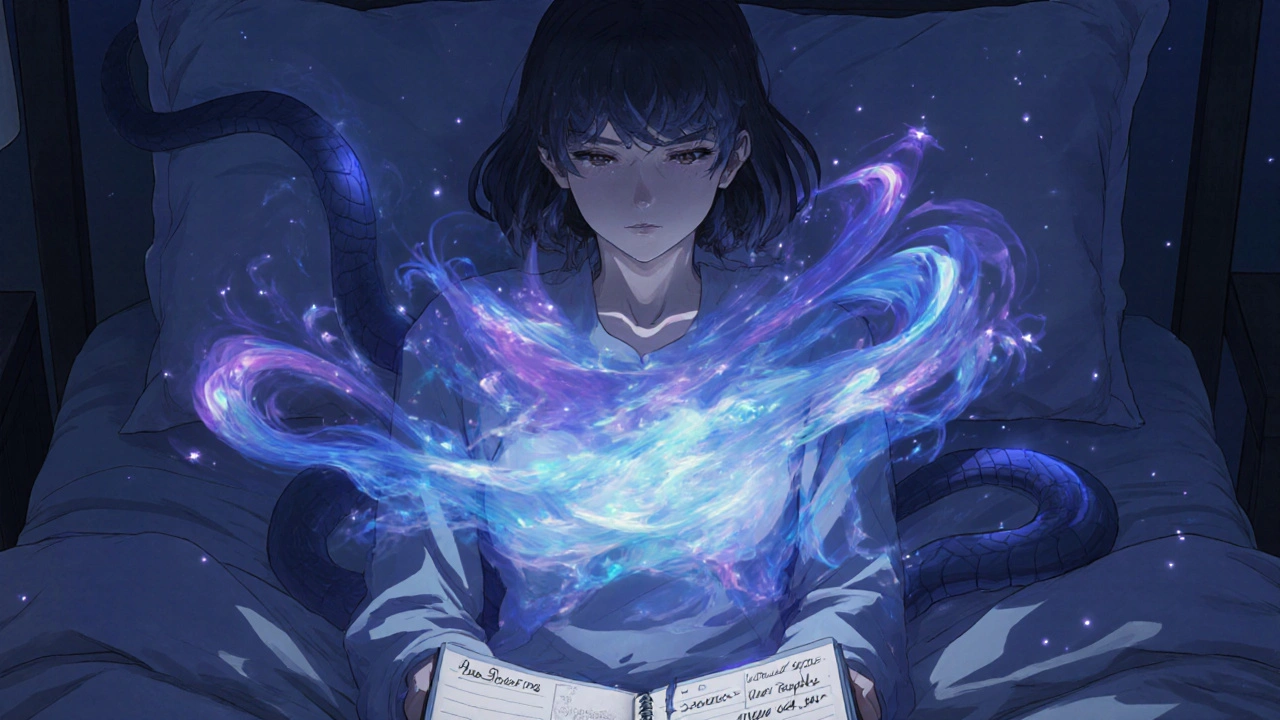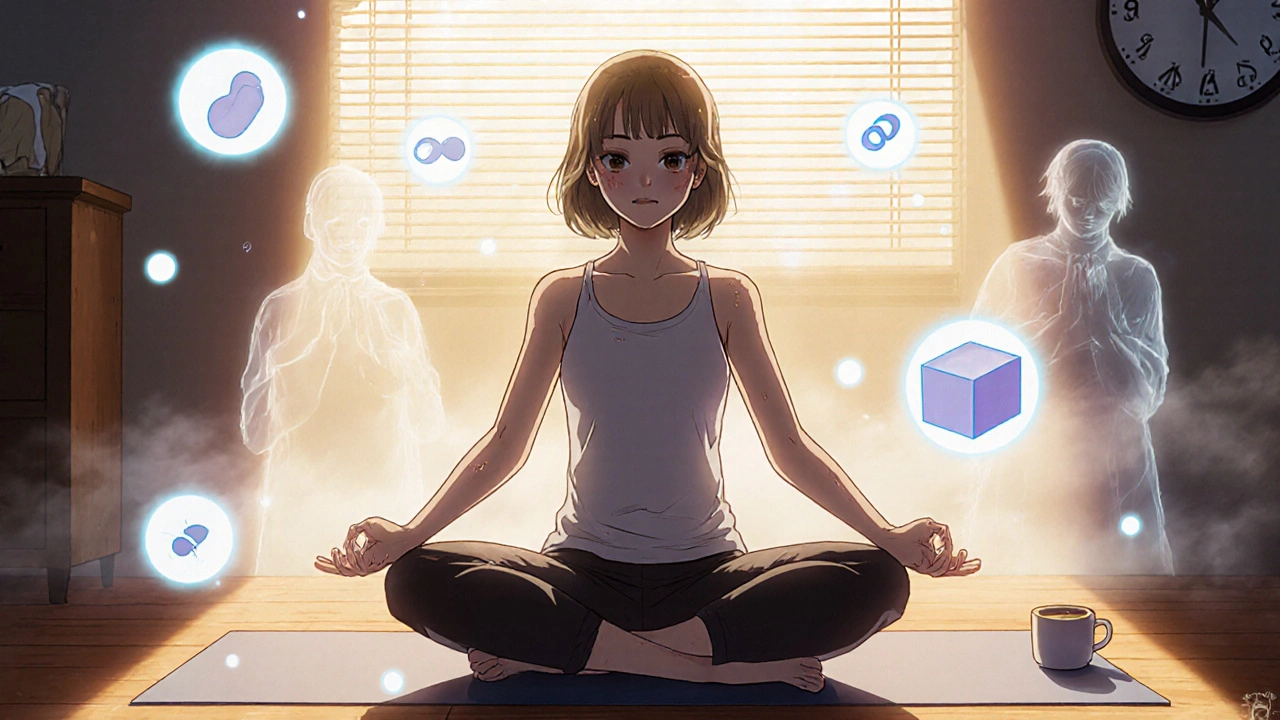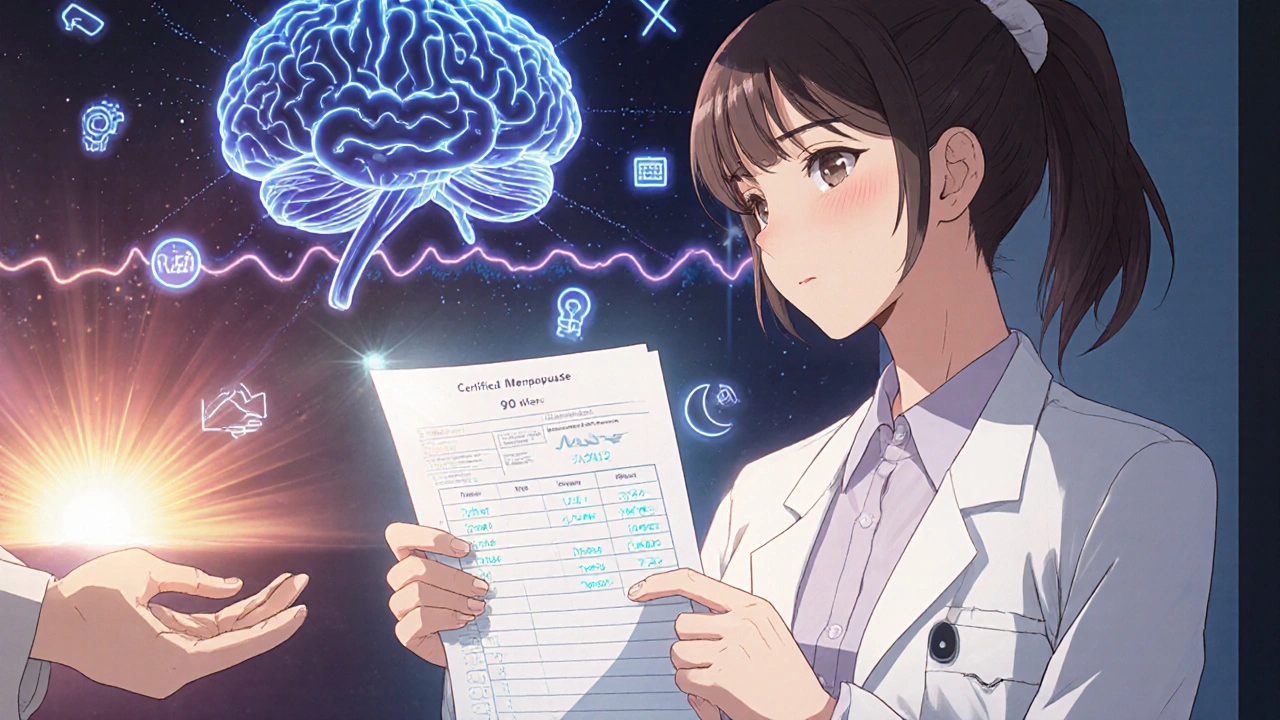Perimenopause and Mood: How Hormonal Shifts Affect Emotions and What Works

Why Your Mood Feels Like It’s on a Rollercoaster
You’re not imagining it. One day you’re fine, the next you’re crying over a spilled cup of coffee or snapping at your partner for no reason. If you’re in your late 30s to mid-50s and noticing sudden shifts in your emotions, it’s likely not stress, burnout, or just "getting older." It’s perimenopause - the years-long transition before your periods stop - and your hormones are behind it.
Estrogen doesn’t just control your cycle. It talks directly to your brain. When estrogen levels swing wildly - dropping one week, spiking the next - they mess with serotonin, dopamine, and GABA, the brain chemicals that keep your mood steady. A 2023 study from Ohio State University found estrogen can fluctuate by 50-60% during this phase. That’s not a gentle fade. That’s a storm inside your nervous system.
The Science Behind the Mood Swings
Estrogen receptors are 30-40% more concentrated in the female brain than in the male brain. That means your brain is far more sensitive to hormonal changes. When estrogen dips, serotonin production drops. That’s the same chemical targeted by antidepressants. No wonder so many women feel flat, anxious, or overwhelmed.
Progesterone, which calms the brain by boosting GABA, also declines. That’s why you might feel on edge, even when you’re not under pressure. Testosterone, often overlooked in women, plays a role too - it affects energy, motivation, and emotional resilience. When all three drop together, your brain’s natural balance gets thrown off.
And it’s not just hormones. Sleep gets wrecked. Hot flashes wake you up. Night sweats leave you drenched. Poor sleep? That’s a direct path to irritability, brain fog, and low mood. Harvard Health found 63% of perimenopausal women struggle with sleep. When you’re tired, your brain can’t regulate emotions well. It’s a cycle: bad sleep → worse mood → more stress → worse sleep.
It’s Not Just Depression - It’s Different
Doctors sometimes mislabel perimenopausal mood changes as clinical depression. But they’re not the same. With regular depression, symptoms are steady. With perimenopause, they come in waves. One week you’re okay, the next you’re sobbing in the grocery store. It doesn’t follow a pattern like PMS. There’s no predictable 14-day cycle. It’s random. Unpredictable. Exhausting.
Research from the American Journal of Psychiatry shows women with perimenopause-related mood issues are 3.2 times more likely to resist standard antidepressants. That’s because SSRIs target serotonin - but if the problem is estrogen dropping, no amount of SSRIs will fix the root cause. You might feel a little better, but the swings keep coming.
And it’s not just you. A 2023 Reddit analysis of over 1,200 posts from perimenopausal women found 78% reported sudden, unexplained rage. 62% said they cried for no reason. 41% admitted their irritability was hurting relationships. These aren’t "bad days." These are biological reactions.

What Treatments Actually Work
There’s no one-size-fits-all fix, but the most effective approaches combine biology and behavior.
Hormone Therapy: The Gold Standard for Many
Low-dose estrogen therapy - patches, gels, or pills - is the most proven treatment for mood symptoms tied to hormonal shifts. My Menopause Centre’s 2022 data shows 72% of women who started HRT saw mood improvements within three months. The North American Menopause Society updated its 2023 guidelines to recommend starting with low-dose estrogen (0.25-0.5 mg daily) before adding antidepressants.
It’s not for everyone. If you have a history of breast cancer, blood clots, or stroke, it’s off the table. But for healthy women without those risks, estrogen can be life-changing. It doesn’t just help hot flashes - it stabilizes your brain chemistry.
SSRIs and SNRIs: The Second Line
If hormones aren’t an option, or if mood symptoms are severe, antidepressants like sertraline or venlafaxine can help. They’re 50-60% effective for mood symptoms, but they won’t touch hot flashes or sleep issues. Some women take them short-term - just until hormone levels stabilize.
Important note: Low-dose SSRIs (like 12.5 mg of escitalopram) can be enough. You don’t need high doses. And they work faster for perimenopausal mood swings than for classic depression - often within 2-4 weeks.
Therapy: The Missing Piece
CBT (cognitive behavioral therapy) isn’t just for "mental illness." It’s for anyone whose brain is overwhelmed. A 2023 FDA-approved app called MenoMood uses CBT techniques to reduce mood symptoms by 35% in just 8 weeks. Talking to a therapist who understands perimenopause helps you reframe thoughts like, "I’m losing control," to "My brain is reacting to hormones. This isn’t me."
Lifestyle: Small Changes, Big Impact
- Sleep first. Keep your room cool. Avoid caffeine after noon. Try magnesium glycinate before bed - it helps with both sleep and anxiety.
- Movement matters. Even 20 minutes of walking daily lowers cortisol. Yoga and tai chi are especially helpful for nervous system regulation.
- Reduce sugar and alcohol. Both spike and crash blood sugar, which triggers mood swings. Alcohol also lowers serotonin and disrupts sleep.
- Omega-3s. A 2022 study in the Journal of Clinical Psychiatry found women taking 2,000 mg of EPA/DHA daily had fewer mood episodes.
What Doesn’t Work (And Why)
Herbal supplements like black cohosh or red clover? Some women swear by them, but studies show inconsistent results. The FDA doesn’t regulate them, and they can interact with other meds.
Just "taking vitamin D" or "eating more greens"? Helpful for general health, but won’t fix a hormonal brain imbalance. Don’t let well-meaning advice distract you from real solutions.
And please - don’t wait until you’re in crisis to act. The average woman tries 2-3 treatments before finding what works. That takes 6-9 months. Start early. Track your symptoms.
Track Your Symptoms - It’s Not Just "In Your Head"
Write down your mood, sleep, hot flashes, and menstrual cycle for 90 days. Use an app like Wild AI (downloaded over 120,000 times) or just a notebook. Look for patterns. Does your irritability spike after your period? Do you feel worse when you’re tired? This isn’t navel-gazing. It’s data.
Doctors need this. Most OB/GYNs still don’t screen for mood changes during perimenopause - but 54% now do, up from 29% in 2018. Bring your log. Say: "I think this is hormonal. Can we test estrogen levels and talk about treatment?"

When to Seek Help - And Who to See
If mood changes are affecting your work, relationships, or ability to function - don’t wait. You don’t need to suffer through this alone.
Look for a certified menopause practitioner (there are about 2,300 in the U.S.). They’re trained in both endocrinology and mental health. If you can’t find one, a psychiatrist who specializes in women’s health or a functional medicine doctor can help.
And if you’ve been told it’s "just stress" or "you’re overreacting" - that’s wrong. The American College of Obstetricians and Gynecologists confirmed in 2021: hormonal changes during perimenopause can trigger or worsen mood disorders. It’s real. It’s biological. And it’s treatable.
What’s Coming Next
Big changes are on the horizon. The NIH just funded a $47 million study tracking 10,000 women over five years to find exact biomarkers linking hormones to brain changes. By 2026-2028, we may have genetic tests that tell you if you’re at risk for severe mood swings during perimenopause.
Meanwhile, gut health is emerging as a key player. Estrogen is metabolized in the gut. If your microbiome is off, estrogen levels drop faster. Early trials are testing probiotics to stabilize hormone metabolism - and early results are promising.
You’re Not Broken. You’re Changing.
Perimenopause isn’t a disease. It’s a natural transition - but it’s one your body and brain weren’t designed to handle alone. The fact that you’re noticing these changes means you’re paying attention. That’s strength.
Don’t let anyone tell you it’s "just part of aging." It’s a medical phase with real biological drivers. And you deserve relief. Whether it’s hormone therapy, therapy, better sleep, or a combination - help is out there. You just need to ask for it.
Anne Nylander
November 21, 2025 AT 22:49Noah Fitzsimmons
November 22, 2025 AT 14:55Shawn Sakura
November 24, 2025 AT 12:34Simone Wood
November 25, 2025 AT 13:47Swati Jain
November 26, 2025 AT 12:29Florian Moser
November 27, 2025 AT 22:57jim cerqua
November 28, 2025 AT 23:43Donald Frantz
November 30, 2025 AT 05:30Debanjan Banerjee
December 1, 2025 AT 09:34Sandi Moon
December 2, 2025 AT 15:35Kartik Singhal
December 2, 2025 AT 18:28Leo Tamisch
December 4, 2025 AT 18:09Daisy L
December 5, 2025 AT 00:23Franck Emma
December 5, 2025 AT 20:19